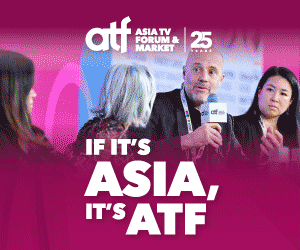
Netflix has 100+ new and returning originals on its slate for 2019. Content vice president, Rob Roy, talks about asking, listening, Asian creators and trying to remove creative pain points.
Netflix said ‘yes’ to returning Korean epic zombie drama Kingdom before the season one premiere on 25 January 2019. No, it wasn’t a tough decision to go with a second season before confirming audience response to the first, says Rob Roy, Netflix’s vice president for content acquisition. That kind of risk is, he adds, “in our DNA. If we believe in something, we will commit to it and go... we want to try to get the second season out as fast as we can, and we recognise that we have to make that commitment sooner rather than later”.
With almost 120 new and returning Asia originals on its slate for 2019, is this where Roy thought he would be at this point in Netflix’s Asia roll out? There was no specific originals target to start with, he says. “We knew there was going to be a very rich offering, great storytelling and capabili- ties within the region,” he says.
Originals in Asia since Netflix’s global launch in January 2016 were less about a number than “a question of figuring out ways to work with people,” he adds. “We didn’t have a specific target in mind, but we have good momentum. I also feel like we’re just getting started.”
Did Netflix arrive in Asia with a genre wishlist? Do you have one now? “The genres we thought were going to be impactful or meaningful have happened... but there are things that surprised us too. That’s the beauty of our model and our approach, as we’ve gone, as we learned, we reiterate and innovate... if you look at the quality of the talent that’s out there, the quiet conversations that are happening, those are all super- encouraging insights.”
How much of the programming agenda for Asia is driven by the stories you’re hearing from writers such as Korea’s Kim Eun-hee (Kingdom) and how much is driven by data that sends you out there looking for specific kinds of stories? “One of the questions we always ask people is ‘what’s the story you want to tell’. It’s an easy way to get into a conversation with the creator and figure out whether we are the right home for the story, whether it makes sense, and how do we help that. We spend a lot of time asking that question and a lot of stories come that way... we’re really putting the creative and the quality of the storyteller’s vision first and foremost. We don’t have to worry about advertisers or...
Netflix has 100+ new and returning originals on its slate for 2019. Content vice president, Rob Roy, talks about asking, listening, Asian creators and trying to remove creative pain points.
Netflix said ‘yes’ to returning Korean epic zombie drama Kingdom before the season one premiere on 25 January 2019. No, it wasn’t a tough decision to go with a second season before confirming audience response to the first, says Rob Roy, Netflix’s vice president for content acquisition. That kind of risk is, he adds, “in our DNA. If we believe in something, we will commit to it and go... we want to try to get the second season out as fast as we can, and we recognise that we have to make that commitment sooner rather than later”.
With almost 120 new and returning Asia originals on its slate for 2019, is this where Roy thought he would be at this point in Netflix’s Asia roll out? There was no specific originals target to start with, he says. “We knew there was going to be a very rich offering, great storytelling and capabili- ties within the region,” he says.
Originals in Asia since Netflix’s global launch in January 2016 were less about a number than “a question of figuring out ways to work with people,” he adds. “We didn’t have a specific target in mind, but we have good momentum. I also feel like we’re just getting started.”
Did Netflix arrive in Asia with a genre wishlist? Do you have one now? “The genres we thought were going to be impactful or meaningful have happened... but there are things that surprised us too. That’s the beauty of our model and our approach, as we’ve gone, as we learned, we reiterate and innovate... if you look at the quality of the talent that’s out there, the quiet conversations that are happening, those are all super- encouraging insights.”
How much of the programming agenda for Asia is driven by the stories you’re hearing from writers such as Korea’s Kim Eun-hee (Kingdom) and how much is driven by data that sends you out there looking for specific kinds of stories? “One of the questions we always ask people is ‘what’s the story you want to tell’. It’s an easy way to get into a conversation with the creator and figure out whether we are the right home for the story, whether it makes sense, and how do we help that. We spend a lot of time asking that question and a lot of stories come that way... we’re really putting the creative and the quality of the storyteller’s vision first and foremost. We don’t have to worry about advertisers or anything other than making a really compelling piece of programming so that our members love it, that they watch a lot of content here and talk about it with their friends. At the end of day, we’re trying to figure out what those stories are, and how we can provide value in telling those stories differently.”
How do you use your data to shape what gets made? “I would say data is mostly a feedback mechanism. What data tells us is... mostly where the audience is and how big that audience currently is, and making sure theright piece of content gets in front of the right person in an accessible way. We use data to think about how big the audience could be, to measure the cost of the production relative to the size of the audience. But when it comes to a commissioning decision, the creative is the most important thing. Is it a compelling story? Is it a world you want to live in? Do you want to know the characters? Is it a story that you want to hear? That’s really the driver.”
The Netflix way of doing things has had a significant impact on the production process in Asia. Has shaping, or re-shaping, that process been difficult for you? “Every day we’re getting smarter. As we ramp up our productions around the world, we learn of lot of things and what that allows us to do is to share those learnings and incorporate the learnings from other markets too. As we get smarter, as we learn to identify local market experts who really know the production landscape and we learn about the pain points in each industry, we can figure out how we can help alleviate those from a creative perspective. We face challenges in every market. No market is perfect... What we are able to do is share our learnings across the world... We’ve got people who are very talented and know how to make really compelling programming. So it cuts both ways. It’s hugely beneficial to us to learn and take those best practices as well.”
What do you think Netflix’s biggest impact on the production industry in Asia has been? “I think us being a prolific buyer of content is good for creators, it’s good for consumers, it’s good for the industry in terms of employment, it creates more demand for great talent. And if we can share some of these learnings, and bring resources that aren’t there today, then that’s also helpful. We also benefit just from the existence and the relationships that we have. Learning from people is hugely helpful.”
What was your biggest surprise? “Content will surprise you... You can’t predict everything. Certain pieces of content are much bigger than we thought... A show like To All the Boys I Loved before was a huge hit for us all over the world. Chinese drama series, A Love So Beautiful, plays really well in various parts of Asia. The End of the F***ing World is another one.”
Singapore’s Shirkers was mentioned at least three times during the what’s next showcase in November. Was that show a surprise? “I would say less of a surprise than more just a great opportunity. We’re a unique platform, we can give that film the broadest distribution possible and it can find an audience. I think what’s coolabout that story is it’s a love letter to Singapore in some sense but also it’s really a story about a filmmaker trying to get her moviemade. and that that resonates with people all over the place.”
What are you happiest about? “I’m really proud of what we’ve accomplished so far and I think we’re just getting started. You know, when you look at the shows that we’re announcing and the calibre of the talent that we’re working with. And the sizes of the audiences that we’re able to aggregate that I’m proud of that and I’m proud of the fact that we’re exposing people to content from all over the world in ways that I think they haven’t had achance to experience before.”
What would you like to change. “I wish we were going faster... I’d love to have even more compelling programmingand build this slate even faster.”
What do you need to be able to do that? “Just time. It’s having those conversations with people finding out what those stories are and setting them up to get made.”
Published in Issue Seven of ContentAsia's in-print + online 2018 (December 2018)



















